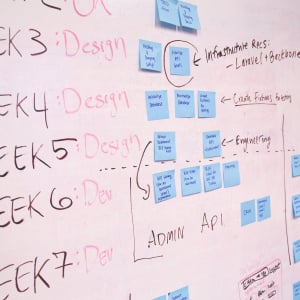Project management is the process of delivering projects to a high standard on time and budget. But, it’s not as if every project goes to plan. Some go off-piste while others hit their mark and goals effortlessly. What’s the difference? Usually, the answer centres on the person in charge. An excellent project manager can work with tight time and money restraints and maintain their employees’ rates of productivity and output.
To learn more about how they do it and what makes a fantastic project manager, take a look at the key points underneath.

What Does A Project Manager Do?
Primarily, a PM oversees a project and ensures it doesn’t go off track in the process. However, that’s the simple version. The role of the project manager has changed in the last decade, often for the better, which means it has become more complicated. Whereas old PMs used to work with vague directives, the strategy is more in-depth today. Not only is a project manager informed of specific targets, but they are involved in the strategy meeting in lots of businesses.
As a result of the boom of project management in recent years, PMs have become crucial cogs in the wheel of the industry. And, as technology and the economy continues to change in the future, the role is bound to become more complicated and valuable.
Main Tasks And Responsibilities
Because every project is different, there is no one-size-fits-all-policy regarding a project manager’s responsibilities. That’s why the best project management courses teach a varied range of skills that will come in handy in several situations and scenarios. Of course, there are general tasks that occur throughout most projects.
- Create and log a plan: While directives are less vague now than they used to be, projects aren’t fully fleshed out and handed out to a manager. Therefore, the PM has a lot of independence regarding delivering outcomes, which means they have to craft and log a plan. This includes planning what work needs to be done, when, and by whom, as well as understanding the non-negotiable requirements.
- Create a timeline: One thing that is almost always included is a deadline; clients have strict time restraints and want results by a specific date. To ensure this deadline is met, the PM will plot out the tasks. By doing this, it enables them to see what needs completing and when and the possible risks.
- Manage the risks: Spotting the risks isn’t enough – a project manager has to manage them effectively. A prime example is going over budget. This is very dangerous as it means either asking the client for more money or using the company’s to cover costs, the latter of which is unacceptable. The PM, then, must track every expenditure, from materials to labour, and make changes in real-time to stop charges from building up.
- Bring a team together: Firstly, the PM builds a team that they believe has the best skill set for the project. But, as necessary is the task of motivating the employees so that they maintain a high standard and level of output. To do this, they need an understanding of how people work and what drives them to succeed.

What Skills Does A Project Manager Need?
Working with a broad range of people to hit targets that are always changing means the project manager must have an electric range of skills. Here are the most essential.
Leadership
The team must follow the leader to ensure goals are achieved. Inspiring others means using a variety of tactics to get the best out of people. Fantastic man managers know when to shout and when to be sympathetic.
Scheduling
Scheduling is a core value of project management as things change at a rapid pace. The ability to deal with glitches and put them right involves crafting a thorough schedule from the beginning. That way, there is a foundation, a reference point, to rely on in a crisis.
Critical Thinking
As the leader, no one is going to make decisions on a manager’s behalf. Critical thinking allows a PM to weigh up the pros and cons come to an informed conclusion. The greatest can react in a matter of minutes.
Communication
Without the ability to explain their strategy, a project manager can’t rally the troops. No will understand their job and how to complete tasks effectively.
Project Managers
The most famous project manager at the moment is Sundar Pichai, the new CEO of Google. However, they come in all shapes and sizes. Check out this excellent post to find out more about project managers and their mentality, and to build your skills consider attending our Project Manager Training London.